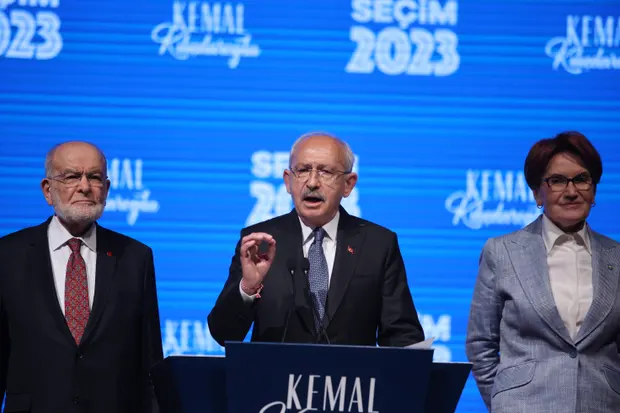Record high turnout in a tightly fought election has presented the Turkish president Recep Tayyip Erdoğan, with the greatest challenge to his leadership in two decades, with signs that the vote was heading for a runoff even as Erdoğan attempted to claim victory before an official vote count had ended.
Speaking to a jubilant crowd of supporters, an energised and delighted Erdoğan declared: “The fact that the election results have not yet been finalised does not diminish the fact that our nation’s choice is clearly in favor of us.”
Despite Turkey’s supreme election council, the YSK, declaring that the count had not yet finished in either the parliamentary or presidential election, Erdoğan claimed his alliance had won a majority.
“We believe I will finish with above 50 percent in the first round,” he added, projecting an outright win the presidential election without the need for a run-off.
Erdoğan’s rival, Kemal Kılıçdaroğlu, hit back in a more subdued speech: “Despite all of his lies and attacks, Erdoğan did not receive the desired outcome. No one should be enthusiastic about this being a done deal. The election is not won on the balcony,” he said.
He added: “We will definitely, definitely win this election in the second round. Everyone will see it. Preliminary results show that Erdoğan did not receive the public confidence vote that he expected. The need for a change in society exceeds 50%. The AKP’s loss of votes demonstrates this too. The process of entering [election] data is ongoing. If the nation opts for a second round, it is more than welcome.”
The head of Turkey’s election board said early on Monday that Erdogan was leading with 49.49%, with 91.93% of ballot boxes opened. Kılıçdaroğlu had 44.49% of votes.
As votes came in from across the country, coverage of the ballot count became a heightened example of the storm of misinformation that has marked the 45 days of the election cycle, including several deployments of deepfake videos.
Officials from the YSK moved to cool any tensions surrounding early results published by the state news agency, amid anger from leading opposition figures and claims the government had demanded repeated recounts of ballots in areas likely to deliver a victory for Kılıçdaroğlu, of the Republican People’s party (CHP), slowing the input of opposition votes into the system.
“There are no disruptions or delays,” said YSK spokesperson Ahmet Yener, during one of multiple press conferences intended to clarify the percentage of overall votes officially counted. The YSK figure has been consistently 20% fewer than that published by the state news agency, Anadolu, which instead described “ballot boxes opened” on its website.
In a brief speech, Kılıçdaroğlu said: “In the ballot boxes where our votes are high, they blocked the system with repeated objections. There are persistent objections for instance in 200 ballot boxes in Ankara and 783 ballot boxes in Istanbul. There are ballot boxes where the vote has been contested six times, 11 times. What you block is the will of Turkey. You cannot prevent it from happening with these objections.”
“I invite the election authority to act responsibly … let’s not block the will of this nation. I’m calling out to our election observers on the ground, never abandon the ballot boxes and election votes. We’re here until the last vote is counted.”
The close race marked a vote in parliamentary and presidential elections that quickly transformed into a referendum on Erdoğan’s two decades in power, amid an energised and unusually broad base of opposition united around the singular aim of toppling a leader who has reshaped Turkey in his image.
If no candidate in the presidential election receives 50% of the vote, a second round runoff will be held on 28 May between the top two candidates. Ultra-nationalist presidential candidate Sinan Oğan, who early results indicated would probably receive about 5% of the vote, reduced the chances of either Erdoğan or Kılıçdaroğlu gaining a clear victory.
Kılıçdaroğlu, a member of Turkey’s Alevi religious minority, said he intends to step back from Erdoğan’s heavy-handed control of public institutions and the media, promising a more inclusive Turkey and an end to the combative style of politics that Erdoğan is known for. The CHP leader has also promised to deport millions of Syrian and Afghan refugees who sought shelter in Turkey from conflicts at home.
Voters across Turkey said that a worsening cost of living crisis and the government’s response to twin deadly earthquakes that killed more than 50,000 people were what drove them to the polls.
Many younger voters said they had turned their back on the AKP, expressing excitement that they could vote out the only political leader they had known in their adult lives. In the Istanbul district of Kasımpaşa, where Erdoğan grew up, three voters in their mid-20s said they were all voting for the CHP.
“No one in Gen Z votes for the AKP,” said 26-year-old Evin. “Erdoğan could absolutely lose, I don’t believe he can win, there isn’t even a 1% chance.”


